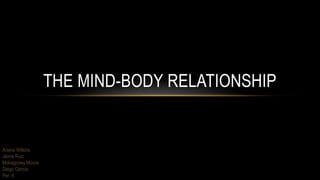
The Mind Body Relationship
- 1. THE MIND-BODY RELATIONSHIP Ariana Wilkins Jaime Ruiz Mohagoney Moore Diego Garcia Per: 6
- 2. Conversion hysteria: The theory that unconscious conflicts can produce physical illnesses symbolizing the restrained conflict; no longer a dominant scientific viewpoint in health psychology. Psychosomatic medicine: A field within psychiatry relating to health psychology developed in the early 1900’s. The studying and treatment of diseases believed to be caused by emotional conflicts. • This term is now used more basically to define a approach to health related problems and disease that come from psychological and bodily origins.
- 3. In pre-human history, disease was thought to arise when an evil spirit entered the body. Treatments primarily consisted of exorcism attempts. • Sharp tools were used to make holes in the head to release the spirits • Shamans performed rituals The theory of human illnesses was developed by the ancient Greeks. They believed disease resulted when the four humors (personalities) of the body were out of balance. The goal of treatment was to return the balance. • Blood = passionate temperament • Black bile = sadness • Yellow bile = angry deposition • Phlegm = laid back approach to life Mind-body relationship in Western medical care is due to East Asian philosophies: Chinese approach focused on the person as a whole • Disharmony shows the cause of illness • Treatment is to restore balance to the body. This can be done through message, acupuncture, exercise, and herbal remedies
- 4. Renaissance and beyond, the humoral theory of illness was thrown away and scientist began to properly search for bodily factors to claim the state of a person’s health. This led to: • The invention of the microscope (1600’s) • Autopsy • Focus on organic & cellular pathology Scientific views continued to change with the rise of modern psychology, particularly with Sigmund Feud’s early work about conversion hysteria. Feud’s literature was full of biologically impossible disturbances that were considered forms of conversion hysteria. Disturbances such as: • Tremors • Muscular Paralysis • Anorexia & Bulimia • Sudden loss of speech, hearing, or sight During the Middle Ages, disease was seen as a punishment from God for evil doings. Treatment of driving out the evil forces was done by: • Torturing the human body • Prayer and penance • Church was used for religious practice and healing which became virtually indistinguishable
- 5. Flanders Dunbar & Franz Alexander later contradicted Sigmund Freud’s scientific beliefs. They believed specific illnesses came from an individuals internal conflicts, linking a single specific conflict to a single specific illness. • This was a major contradiction against Sigmund Feud who believed conversion reactions occur without any necessary psychological changes Both Flanders Dunbar & Franz Alexander helped shape the field of psychosomatic medicine by creating descriptions of physical illnesses caused or aggravated by an internal conflict. This caused a movement changing the beliefs in the relationship between the mind and body. Thanks to this, we know: • Physical health is connected with psychological health • All conditions are connected to early psychological signs and social factors • Prognosis and treatment is done through symptoms and the patient and doctors relationship • Staying well is determined by good habits This then threw away the scientific view point of conversion hysteria and brought along psychosomatic medicine.
- 6. Many of these theories of the relationship between the body and mind are not to the highest scientific standard. Problems that theories contain are that: • A person’s conflict and personality type is not enough to produce an illness • Illnesses that come from genetics, internal / external conflict, and coping are more reasonable scientific explanations. It is impossible to know what keeps people healthy without the knowledge of the psychological and social context within which health and illness are experienced.